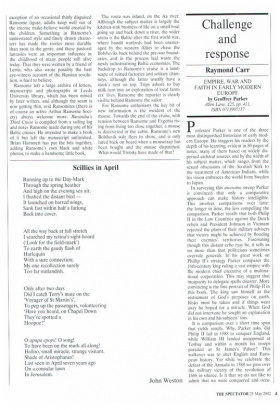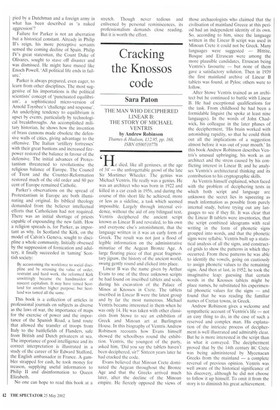Challenge and response
Raymond Carr
EMPIRE, WAR AND FAITH IN EARLY MODERN EUROPE by Geoffrey Parker Allen Lane, £25, pp. 411, ISBN 0713995157 Professor Parker is one of the three most distinguished historians of early modern Europe. He staggers his readers by the depth of his learning, evident in 80 pages of notes, many of them based on widely dispersed archival sources and by the width of his subject matter, which ranges from the sexual obsessions of the Scottish Kirk to the treatment of American Indians, while his vision embraces the world from Sweden to Japan.
In surveying this awesome sweep Parker is convinced that only a comparative approach can make history intelligible. This involves comparisons over time: the longer in time, the less compelling the comparison. Parker recalls that both Philip II in the Low Countries against the Dutch rebels and President Johnson in Vietnam rejected the plans of their military advisers that victory might be achieved by flooding their enemies' territories. Fascinating though this distant echo may be, it tells us no more than that politicians sometimes overrule generals. In his great work on Phillip Ifs strategy Parker compares the 16th-century king ruling a vast empire with the modern chief executive of a multinational corporation. This may suggest that incapacity to delegate spells disaster. More convincing is the fine portrait of Philip II in this book. The king saw himself as the instrument of God's purposes on earth. Risks must be taken and if things went awry he hoped for a miracle. When God did not intervene he sought an explanation in his own and his subjects' sins.
It is comparison over a short time span that yields results. Why, Parker asks, did Philip II fail in 1588 to conquer England, while William III landed unopposed at Torbay and within a month his troops paraded at St James's Palace? This walkover was to alter English and European history. Yet while we celebrate the defeat of the Armada in 1588 we pass over the military victory of the revolution of 1688 in silence. Is it that we do not like to admit that we were conquered and occu
pied by a Dutchman and a foreign army in what has been described as 'a naked aggression'?
Failure for Parker is not an aberration but a historical constant. Already in Philip II's reign, his more perceptive servants sensed the coming decline of Spain. Philip IV's great statesman, the Count Duke of Olivares, sought to stave off disaster and was dismissed. He might have mused like Enoch Powell, 'All political life ends in failure.'
Parker is always prepared, even eager, to learn from other disciplines. The most suggestive of his importations is the political scientists' concept of 'punctuated equilibrium', a sophisticated micro-version of Arnold Toynbee's 'challenge and response'. An underlying tendency to equilibrium is upset by events, particularly by technological breakthroughs. An accomplished military historian, he shows how the invention of brass cannons made obsolete the defensive walls of cities, giving advantage to the offensive. The Italian 'artillery fortresses' with their great bastions and increased firepower restored the balance in favour of the defensive. The initial advances of Protestantism threatened to revolutionise the religious balance of Europe. The Council of Trent and the Counter-Reformation restored much of the old order and 80 per cent of Europe remained Catholic.
Parker's observations on the spread of Protestantism in Europe are both illuminating and original. Its biblical theology demanded from the believer intellectual efforts that Catholicism had not required. There was an initial shortage of priests capable of expounding the new faith. How a religion spreads is, for Parker, as important as why. In Scotland the Kirk, on the model of Calvin's Geneva, sought to discipline a whole community. Initially obsessed by the suppression of fornication and adultery, it finally succeeded in 'taming' Scottish society:
By accustoming the workforce to social discipline and by stressing the value of order, restraint and hard work, the reformed Kirk unwittingly became the handmaiden of nascent capitalism. It may have tamed Scotland for another higher purpose; but Scotland was tamed all the same.
This book is a collection of articles in professional journals on subjects as diverse as the laws of war, the importance of maps for the exercise of power and the importance of the Spanish Road, a land route that allowed the transfer of troops from Italy to the battlefields of Flanders, safe from British and Dutch privateers at sea. The importance of good intelligence and its correct interpretation is illustrated in a study of the career of Sir Edward Stafford, the English ambassador in France. A gambler strapped for cash, he took money for treason, supplying useful information to Philip II and disinformation to Queen Elizabeth.
No one can hope to read this book at a stretch. Though never tedious and enlivened by personal reminiscences, its professionalism demands close reading. But it is worth the effort.























































































 Previous page
Previous page